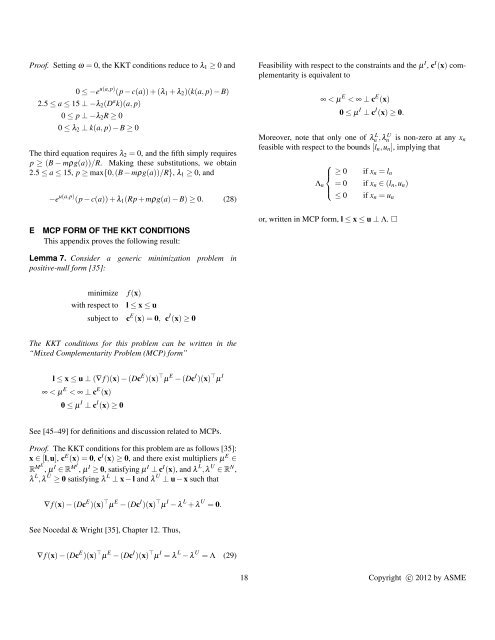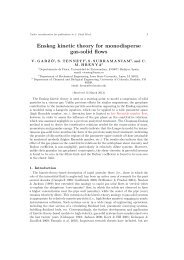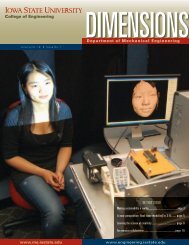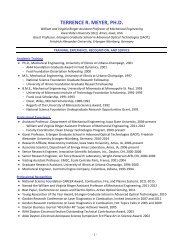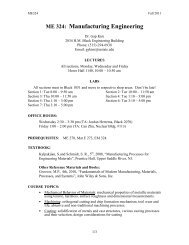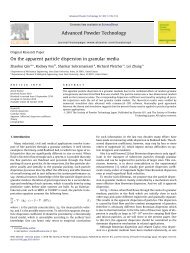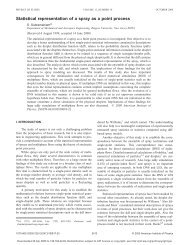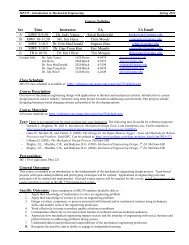Consider-then-Choose Models in Decision-Based Design ...
Consider-then-Choose Models in Decision-Based Design ...
Consider-then-Choose Models in Decision-Based Design ...
You also want an ePaper? Increase the reach of your titles
YUMPU automatically turns print PDFs into web optimized ePapers that Google loves.
Proof. Sett<strong>in</strong>g ω = 0, the KKT conditions reduce to λ 1 ≥ 0 and<br />
0 ≤ −e u(a,p) (p − c(a)) + (λ 1 + λ 2 )(k(a, p) − B)<br />
2.5 ≤ a ≤ 15 ⊥ −λ 2 (D a k)(a, p)<br />
0 ≤ p ⊥ −λ 2 R ≥ 0<br />
0 ≤ λ 2 ⊥ k(a, p) − B ≥ 0<br />
The third equation requires λ 2 = 0, and the fifth simply requires<br />
p ≥ (B − mρg(a))/R. Mak<strong>in</strong>g these substitutions, we obta<strong>in</strong><br />
2.5 ≤ a ≤ 15, p ≥ max{0,(B − mρg(a))/R}, λ 1 ≥ 0, and<br />
−e u(a,p) (p − c(a)) + λ 1 (Rp + mρg(a) − B) ≥ 0. (28)<br />
Feasibility with respect to the constra<strong>in</strong>ts and the µ I , c I (x) complementarity<br />
is equivalent to<br />
∞ < µ E < ∞ ⊥ c E (x)<br />
0 ≤ µ I ⊥ c I (x) ≥ 0.<br />
Moreover, note that only one of λn L ,λn<br />
U is non-zero at any x n<br />
feasible with respect to the bounds [l n ,u n ], imply<strong>in</strong>g that<br />
⎧<br />
⎪⎨ ≥ 0 if x n = l n<br />
Λ n = 0 if x n ∈ (l n ,u n )<br />
⎪ ⎩<br />
≤ 0<br />
if x n = u n<br />
E<br />
MCP FORM OF THE KKT CONDITIONS<br />
This appendix proves the follow<strong>in</strong>g result:<br />
or, written <strong>in</strong> MCP form, l ≤ x ≤ u ⊥ Λ. □<br />
Lemma 7. <strong>Consider</strong> a generic m<strong>in</strong>imization problem <strong>in</strong><br />
positive-null form [35]:<br />
m<strong>in</strong>imize f (x)<br />
with respect to l ≤ x ≤ u<br />
subject to c E (x) = 0, c I (x) ≥ 0<br />
The KKT conditions for this problem can be written <strong>in</strong> the<br />
“Mixed Complementarity Problem (MCP) form”<br />
l ≤ x ≤ u ⊥ (∇ f )(x) − (Dc E )(x) ⊤ µ E − (Dc I )(x) ⊤ µ I<br />
∞ < µ E < ∞ ⊥ c E (x)<br />
0 ≤ µ I ⊥ c I (x) ≥ 0<br />
See [45–49] for def<strong>in</strong>itions and discussion related to MCPs.<br />
Proof. The KKT conditions for this problem are as follows [35]:<br />
x ∈ [l,u], c E (x) = 0, c I (x) ≥ 0, and there exist multipliers µ E ∈<br />
R ME , µ I ∈ R MI , µ I ≥ 0, satisfy<strong>in</strong>g µ I ⊥ c I (x), and λ L ,λ U ∈ R N ,<br />
λ L ,λ U ≥ 0 satisfy<strong>in</strong>g λ L ⊥ x − l and λ U ⊥ u − x such that<br />
∇ f (x) − (Dc E )(x) ⊤ µ E − (Dc I )(x) ⊤ µ I − λ L + λ U = 0.<br />
See Nocedal & Wright [35], Chapter 12. Thus,<br />
∇ f (x) − (Dc E )(x) ⊤ µ E − (Dc I )(x) ⊤ µ I = λ L − λ U = Λ (29)<br />
18 Copyright c○ 2012 by ASME


